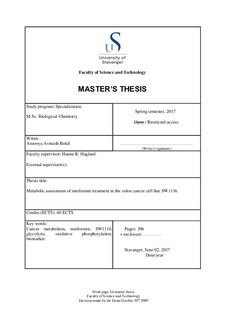| dc.contributor.advisor | Hagland, Hanne | |
| dc.contributor.author | Bokil, Ansooya | |
| dc.date.accessioned | 2017-10-03T08:55:37Z | |
| dc.date.available | 2017-10-03T08:55:37Z | |
| dc.date.issued | 2017-06-02 | |
| dc.identifier.uri | http://hdl.handle.net/11250/2457976 | |
| dc.description | Master's thesis in Biological chemistry | nb_NO |
| dc.description.abstract | Cancers have different metabolic profiles, with varying dependency on glycolysis and mitochondrial oxidative phosphorylation (OXPHOS). The metabolic profile of cancer influences it sensitivity to treatments. Metformin, an anti-diabetic drug, affecting cellular metabolism has been found to have preventive, therapeutic and anti-proliferative effects on cancer. As the suggested target for metformin is mitochondrial complex I, cancer cells relying more on OXPHOS may be more sensitive to metformin treatment. However, the dosage used for metformin treatment is important and studies show that the highest achieved metformin concentration is in the gastrointestinal tract (GI) tract. This suggests that cancers of GI tract could be responsive to metformin treatment and show therapeutic and antiproliferative effects. This project was designed to investigate how colorectal cancer cell lines of opposing metabolic phenotype responded to metformin treatment within the therapeutic range of metformin and in a physiological glucose background.
SW1116, a mitochondria dependent colorectal cancer cell line was used to study the effects of metformin. Viability protein and gene expression of metabolic proteins was studied. The glucose receptor GLUT1 was used as a marker for metformin induced effects. All experiments were conducted in two different growth media using high (25mM) and low (5 mM) glucose.
Metformin treatment caused a significant reduction in proliferation of SW1116 cells. GLUT1 protein and gene expression showed no significant increase on reduction of glucose but, a significant increase was observed with metformin treatment in high and low glucose. Organic Cation Transporter 1 (OCT1) gene expression was found to decrease with metformin treatment. Uncoupling Protein 2 (UCP2) gene expression was found to decrease in low glucose levels and it decreased further on metformin treatment. UCP2 gene expression was found to increase with metformin treatment in high glucose.
SW1116 cells were found to be sensitive to metformin. GLUT1 and UCP2 could be biomarkers to understand the metabolic alterations in cells after addition of metformin. OCT1, responsible for metformin uptake, could also be a biomarker to understand the sensitivity of cancer to metformin. | nb_NO |
| dc.language.iso | eng | nb_NO |
| dc.publisher | University of Stavanger, Norway | nb_NO |
| dc.relation.ispartofseries | Masteroppgave/UIS-TN-IMN/2017; | |
| dc.rights | Navngivelse-Ikkekommersiell 4.0 Internasjonal | * |
| dc.rights.uri | http://creativecommons.org/licenses/by-nc/4.0/deed.no | * |
| dc.subject | metformin | nb_NO |
| dc.subject | SW1116 | nb_NO |
| dc.subject | glycolysis | nb_NO |
| dc.subject | oxidative phosphorylation | nb_NO |
| dc.subject | biomarker | nb_NO |
| dc.subject | cancer metabolism | nb_NO |
| dc.subject | kreft | nb_NO |
| dc.subject | biologisk kjemi | nb_NO |
| dc.subject | biological chemistry | nb_NO |
| dc.title | Metabolic assessment of metformin treatment in the colon cancer cell line SW1116. | nb_NO |
| dc.type | Master thesis | nb_NO |
| dc.subject.nsi | VDP::Mathematics and natural science: 400::Basic biosciences: 470::Biochemistry: 476 | nb_NO |

